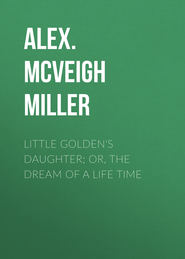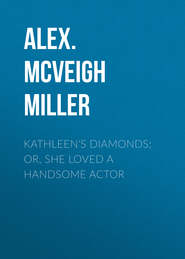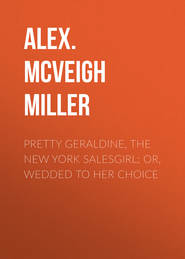По всем вопросам обращайтесь на: info@litportal.ru
(©) 2003-2024.
✖
Countess Vera; or, The Oath of Vengeance
Настройки чтения
Размер шрифта
Высота строк
Поля
"What else can I possibly do, Ivy?"
Mrs. Cleveland, who had been silently cogitating, answers with sudden blandness:
"If you want my advice, Leslie, you shall have it, unfairly as you have treated us. I say the girl is ignorant and uneducated, and quite unfit to become the mistress of your elegant home in Philadelphia. If you are compelled to stick to your unlucky bargain, you must try and make the best of it. You will have to put her into a strict convent school where her ill-nature will be tamed down, and her manners educated up to the proper standard for your wife. How do you like that plan?"
Her magnetic gaze is fixed on Ivy as she speaks, compelling her to be silent, though she was raising her shrill voice in protest.
"Would they be harsh with her?" Leslie asks anxiously, some instinct of pity for the orphan girl struggling blindly in his heart.
"Not at all. I was educated at a convent school myself. I liked it very much. But you will have to be very positive about Vera, to induce her to go. She will wheedle you out of the notion if possible. Raw, untrained girl as she is, she thinks she is quite capable of doing anything, or filling any position. But if you listen to her, you will find yourself mortified and disgraced directly," blandly insinuates the wily woman.
Leslie Noble winces as she had meant he should. He is very proud and sensitive, this rich, handsome man who finds himself placed, through his weakness, in such a sore strait.
"I think your plan is a very good one," he says, hastily. "Do you know where there is a school, such as you named just now?"
"I can give you the address of one in Maryland," Mrs. Cleveland answers, readily.
"I will go there to-morrow and make arrangements for her reception as a pupil," he replies. "Would it be better to apprise her of my intention beforehand?" he inquires with some embarrassment.
"No, decidedly not. She might find means to circumvent you. She is a very sharp witted girl. Merely tell her that you are called away unexpectedly, on business, and that you will leave her in my charge until you return."
"Would it be agreeable to you to have her stay that long?" he queries.
Mrs. Cleveland smiles a little grimly.
"Of course, as your wife, Vera may expect every courtesy from me," she answers in a strange kind of voice, and there the conference ends.
From her hiding-place in the adjoining room Vera creeps out with a white face, and takes her way up-stairs to her mother's room. Her step is slow and heavy, her eyes are dull and black, there is no single gleam of brightness in them. The last drop has been added to the already overflowing cup of misery and despair.
With an unfaltering hand she goes to a small medicine chest kept for her mother's use, and unlocking it, takes out two small vials filled with a dark-colored liquid. Each vial has a label pasted on, containing written directions for use, but without the name of the drug.
Vera knits her straight, black brows thoughtfully together as she puzzles over them. "I remember," she says, aloud, "that mamma said one would produce a long, deep sleep, the other—death! Now which is which?"
After a minute she decides to her satisfaction, and placing one vial back, goes away with the other in her bosom. In her own little room she sits down to pen a few words to Leslie, then slowly kneels by the bedside.
"I do not think anyone can blame me," she murmurs, "not even God. The world is so cold and hard I cannot live in it any longer. I am going to my mother."
Some broken, pleading words falter over the quivering, white lips, then a low amen.
She rises, puts the treasured vial to her lips, and drains the last bitter drop, throwing the empty vessel on the hearth where it cracks into a hundred fragments. Then she lies down upon the bed with her letter to Leslie clenched tightly in her slim white hand. And when they come to awake her in the morning, she is lying mute and pale, with the marble mask of death over all her beauty.
CHAPTER VI
When they tell Leslie Noble the fatal truth—when they lead him to the cold, bare chamber where his girl-wife lies dead, he is stunned by the swift and terrible blow that the hand of fate has dealt him. A quick remorse has entered his soul. He did not love her, yet he would not have the light of her young, strong life go out in darkness like that.
Though he has walked the floor of his room all night, raving, and almost cursing himself because he had married her, the sight of her now—like that—and the sad pathos of that brief letter touch him to the depths of his heart with a vain remorse and pity. With a faltering voice he reads aloud the sad and hopeless words:
"When you come to bid me good-by in the morning I shall be dead. That is best. You see, I did not know till to-night my sad story, and that—that you did not love me! Poor mamma was wrong to bind you so. I am very sorry, Leslie. There is nothing I can do but die!"
His glance falls on Mrs. Cleveland, who is standing in the room with a strange expression upon her face. He does not like to think it is relief and satisfaction, and yet it is marvelously like it.
"Who has told her the truth? How has she learned it?" he asks. "I never meant that she should know. I meant to do my duty by the poor, friendless girl."
"No one told her. She must have listened at the door last night. It was like her low, mean disposition to be peeping, and prying, and listening to what did not concern her," Mrs. Cleveland bursts out, scornfully.
"Pardon me, but our conversation did concern her," he answers, gravely.
"At least, it was not intended for her hearing," she replies, shortly.
Mr. Noble is silent a moment, gazing earnestly at the pale, dead face, from which the woman's eyes turn in fear and aversion.
"Perhaps we have wronged her," he says, slowly. "If she had been what you believed her—coarse and low, and violent like her father—would she have been driven," shudderingly, "to this!"
"You are allowing a maudlin sentimentality to run away with your reason, Leslie," the woman answers, coldly. "Do you suppose I have lied to you? The girl has lived here since infancy. I knew her temper well, and I repeat that she was unbearable. I only endured her for her mother's sake. This is very sad. Of course, you feel badly over it. And yet, common sense whispers that this is a most fortunate thing for you. You are freed from a galling bond. Had she lived, she would almost inevitably have become a sorrow and a disgrace to you."
"We should not speak ill of the dead," he answers, a little sternly.
"Pardon me; I know there are some truths which we innately feel, but should not give expression to," she answers, with keen irony.
"Does Ivy know?" he asks her.
"Not yet; poor dear, I have been watching by her bedside all night. She is ill and almost heart-broken. I must go and break the news to her now."
She moves to the door, but, seeing him standing irresolute in the center of the floor, looks back over her shoulder to say, anxiously:
"Will you come away now, Leslie? The women would like to come in to prepare the body for the grave."
He shivers, and turns to follow her, casting one long, lingering look at the fair, immobile face upon the pillow.
"I did not know she was so beautiful," he murmurs to himself as he passes out.
"Have you no message to send Ivy?" Mrs. Cleveland asks him, as they pass along the hall. "She would be so glad of even one kind word from you."
"I thought you interdicted all intercourse between us last night," he answers, blankly.
"Yes; but the obstacle no longer remains," she replies, significantly, and, with a violent start, Leslie realizes the truth of her words. In his horror and surprise he had not thought of it before. Yes, Vera's death has set him free—free to marry Ivy when he will.
"Tell her that I am very sorry she is ill. I hope she will soon be better," he answers, gravely and courteously. He will not say more now out of respect to the dead, and Mrs. Cleveland is wise enough not to press him.
Ivy, whose pretended illness is altogether a sham, is jubilant over the news.
"Was there ever anything more fortunate?" she exclaims. "Lucky for us that she listened, and found out the truth."
"Yes, indeed, she saved me a vast deal of plotting and planning, for I was determined that she should be put out of the way somehow, and that soon," Mrs. Cleveland answers, heartlessly. "The little fool! I did not think she had the courage to kill herself, but I am very much obliged to her."
"'Nothing in her life became her like the leaving it,'" Ivy quotes, heartlessly.
"Remember, Ivy, you must not allow Leslie to perceive your joy. He is very peculiar—weak-minded, indeed," scornfully. "And he might be offended. Just now he is carried away by a maudlin sentimentality over her tragic death."
Mrs. Cleveland, who had been silently cogitating, answers with sudden blandness:
"If you want my advice, Leslie, you shall have it, unfairly as you have treated us. I say the girl is ignorant and uneducated, and quite unfit to become the mistress of your elegant home in Philadelphia. If you are compelled to stick to your unlucky bargain, you must try and make the best of it. You will have to put her into a strict convent school where her ill-nature will be tamed down, and her manners educated up to the proper standard for your wife. How do you like that plan?"
Her magnetic gaze is fixed on Ivy as she speaks, compelling her to be silent, though she was raising her shrill voice in protest.
"Would they be harsh with her?" Leslie asks anxiously, some instinct of pity for the orphan girl struggling blindly in his heart.
"Not at all. I was educated at a convent school myself. I liked it very much. But you will have to be very positive about Vera, to induce her to go. She will wheedle you out of the notion if possible. Raw, untrained girl as she is, she thinks she is quite capable of doing anything, or filling any position. But if you listen to her, you will find yourself mortified and disgraced directly," blandly insinuates the wily woman.
Leslie Noble winces as she had meant he should. He is very proud and sensitive, this rich, handsome man who finds himself placed, through his weakness, in such a sore strait.
"I think your plan is a very good one," he says, hastily. "Do you know where there is a school, such as you named just now?"
"I can give you the address of one in Maryland," Mrs. Cleveland answers, readily.
"I will go there to-morrow and make arrangements for her reception as a pupil," he replies. "Would it be better to apprise her of my intention beforehand?" he inquires with some embarrassment.
"No, decidedly not. She might find means to circumvent you. She is a very sharp witted girl. Merely tell her that you are called away unexpectedly, on business, and that you will leave her in my charge until you return."
"Would it be agreeable to you to have her stay that long?" he queries.
Mrs. Cleveland smiles a little grimly.
"Of course, as your wife, Vera may expect every courtesy from me," she answers in a strange kind of voice, and there the conference ends.
From her hiding-place in the adjoining room Vera creeps out with a white face, and takes her way up-stairs to her mother's room. Her step is slow and heavy, her eyes are dull and black, there is no single gleam of brightness in them. The last drop has been added to the already overflowing cup of misery and despair.
With an unfaltering hand she goes to a small medicine chest kept for her mother's use, and unlocking it, takes out two small vials filled with a dark-colored liquid. Each vial has a label pasted on, containing written directions for use, but without the name of the drug.
Vera knits her straight, black brows thoughtfully together as she puzzles over them. "I remember," she says, aloud, "that mamma said one would produce a long, deep sleep, the other—death! Now which is which?"
After a minute she decides to her satisfaction, and placing one vial back, goes away with the other in her bosom. In her own little room she sits down to pen a few words to Leslie, then slowly kneels by the bedside.
"I do not think anyone can blame me," she murmurs, "not even God. The world is so cold and hard I cannot live in it any longer. I am going to my mother."
Some broken, pleading words falter over the quivering, white lips, then a low amen.
She rises, puts the treasured vial to her lips, and drains the last bitter drop, throwing the empty vessel on the hearth where it cracks into a hundred fragments. Then she lies down upon the bed with her letter to Leslie clenched tightly in her slim white hand. And when they come to awake her in the morning, she is lying mute and pale, with the marble mask of death over all her beauty.
CHAPTER VI
When they tell Leslie Noble the fatal truth—when they lead him to the cold, bare chamber where his girl-wife lies dead, he is stunned by the swift and terrible blow that the hand of fate has dealt him. A quick remorse has entered his soul. He did not love her, yet he would not have the light of her young, strong life go out in darkness like that.
Though he has walked the floor of his room all night, raving, and almost cursing himself because he had married her, the sight of her now—like that—and the sad pathos of that brief letter touch him to the depths of his heart with a vain remorse and pity. With a faltering voice he reads aloud the sad and hopeless words:
"When you come to bid me good-by in the morning I shall be dead. That is best. You see, I did not know till to-night my sad story, and that—that you did not love me! Poor mamma was wrong to bind you so. I am very sorry, Leslie. There is nothing I can do but die!"
His glance falls on Mrs. Cleveland, who is standing in the room with a strange expression upon her face. He does not like to think it is relief and satisfaction, and yet it is marvelously like it.
"Who has told her the truth? How has she learned it?" he asks. "I never meant that she should know. I meant to do my duty by the poor, friendless girl."
"No one told her. She must have listened at the door last night. It was like her low, mean disposition to be peeping, and prying, and listening to what did not concern her," Mrs. Cleveland bursts out, scornfully.
"Pardon me, but our conversation did concern her," he answers, gravely.
"At least, it was not intended for her hearing," she replies, shortly.
Mr. Noble is silent a moment, gazing earnestly at the pale, dead face, from which the woman's eyes turn in fear and aversion.
"Perhaps we have wronged her," he says, slowly. "If she had been what you believed her—coarse and low, and violent like her father—would she have been driven," shudderingly, "to this!"
"You are allowing a maudlin sentimentality to run away with your reason, Leslie," the woman answers, coldly. "Do you suppose I have lied to you? The girl has lived here since infancy. I knew her temper well, and I repeat that she was unbearable. I only endured her for her mother's sake. This is very sad. Of course, you feel badly over it. And yet, common sense whispers that this is a most fortunate thing for you. You are freed from a galling bond. Had she lived, she would almost inevitably have become a sorrow and a disgrace to you."
"We should not speak ill of the dead," he answers, a little sternly.
"Pardon me; I know there are some truths which we innately feel, but should not give expression to," she answers, with keen irony.
"Does Ivy know?" he asks her.
"Not yet; poor dear, I have been watching by her bedside all night. She is ill and almost heart-broken. I must go and break the news to her now."
She moves to the door, but, seeing him standing irresolute in the center of the floor, looks back over her shoulder to say, anxiously:
"Will you come away now, Leslie? The women would like to come in to prepare the body for the grave."
He shivers, and turns to follow her, casting one long, lingering look at the fair, immobile face upon the pillow.
"I did not know she was so beautiful," he murmurs to himself as he passes out.
"Have you no message to send Ivy?" Mrs. Cleveland asks him, as they pass along the hall. "She would be so glad of even one kind word from you."
"I thought you interdicted all intercourse between us last night," he answers, blankly.
"Yes; but the obstacle no longer remains," she replies, significantly, and, with a violent start, Leslie realizes the truth of her words. In his horror and surprise he had not thought of it before. Yes, Vera's death has set him free—free to marry Ivy when he will.
"Tell her that I am very sorry she is ill. I hope she will soon be better," he answers, gravely and courteously. He will not say more now out of respect to the dead, and Mrs. Cleveland is wise enough not to press him.
Ivy, whose pretended illness is altogether a sham, is jubilant over the news.
"Was there ever anything more fortunate?" she exclaims. "Lucky for us that she listened, and found out the truth."
"Yes, indeed, she saved me a vast deal of plotting and planning, for I was determined that she should be put out of the way somehow, and that soon," Mrs. Cleveland answers, heartlessly. "The little fool! I did not think she had the courage to kill herself, but I am very much obliged to her."
"'Nothing in her life became her like the leaving it,'" Ivy quotes, heartlessly.
"Remember, Ivy, you must not allow Leslie to perceive your joy. He is very peculiar—weak-minded, indeed," scornfully. "And he might be offended. Just now he is carried away by a maudlin sentimentality over her tragic death."











